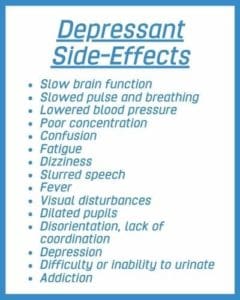What Do Depressants Do?
A group of drugs that reduce arousal and brain stimulation, depressants may not actually be what you think. They do not directly induce what we all know as depression, rather they have an effect on the central nervous system that produces effects often observed in an individual with depression. Alcohol, benzodiazepines, and kava are a few examples of common depressants.
How do Depressants Work?
Depressants work by signaling an increase in the production of GABA, a neurotransmitter. GABA neurotransmitters bind with receptors in the brain that are associated with inducing relaxation and sleep. Naturally occurring amounts of GABA is known to help with improving sleep and reducing stress. Although this is extremely beneficial for one’s overall health, artificially high levels of GABA can have dangerous side effects.
Depending on the strength and dose of a particular depressant, it can cause the CNS to slow various biological functions including heart rate, breathing, and digestion. When someone is experiencing high levels of stress and anxiety, they may also have an increased heart rate and breathing. High amounts of stress can take a serious toll on the body, which is why pharmaceutical depressants can be beneficial in some circumstances. However, in the wrong dosage or in an unregulated situation, depressants can have dire consequences.
Why are Depressants Addictive?
Unfortunately, depressants aren’t just dangerous; depressants are addictive. For one, these drugs do produce a state of euphoria and relaxation. Although some people love being active and alert, many also find joy in relaxation. For this reason, it is easy to understand why an individual may actually get joy from using depressants. The problem is when an individual begins to rely on these substances to achieve and maintain a sense of relaxation. This is also referred to as a psychological addiction.

In addition to being psychologically or emotionally addicted to depressants, it is possible to become physically addicted to them. When a neurotransmitter such as GABA is produced in unusually high or low amounts for extended periods of time, the brain cells will actually begin to physically change in an effort to regulate the amount of the neurotransmitter’s that bind to the appropriate receptors. This is referred to as physical dependence. Once physical dependence has developed, discontinued use of depressants can lead to withdrawal symptoms. Depressant withdrawal symptoms typically include anxiety, insomnia, and increased heart rate. At this point, the individual may continue to use depressants simply to avoid withdrawal.
When to Get Help
Once psychological or physical dependence has developed, discontinuing use can be difficult to do. This is particularly true if the underlying issues that initially led to the use of depressants have not been addressed. When any signs of addiction, dependence, or withdrawal are observed, it is time to get help. Do not wait, as addiction typically gets worse over time. Contact an addiction treatment admissions coordinator today!











































